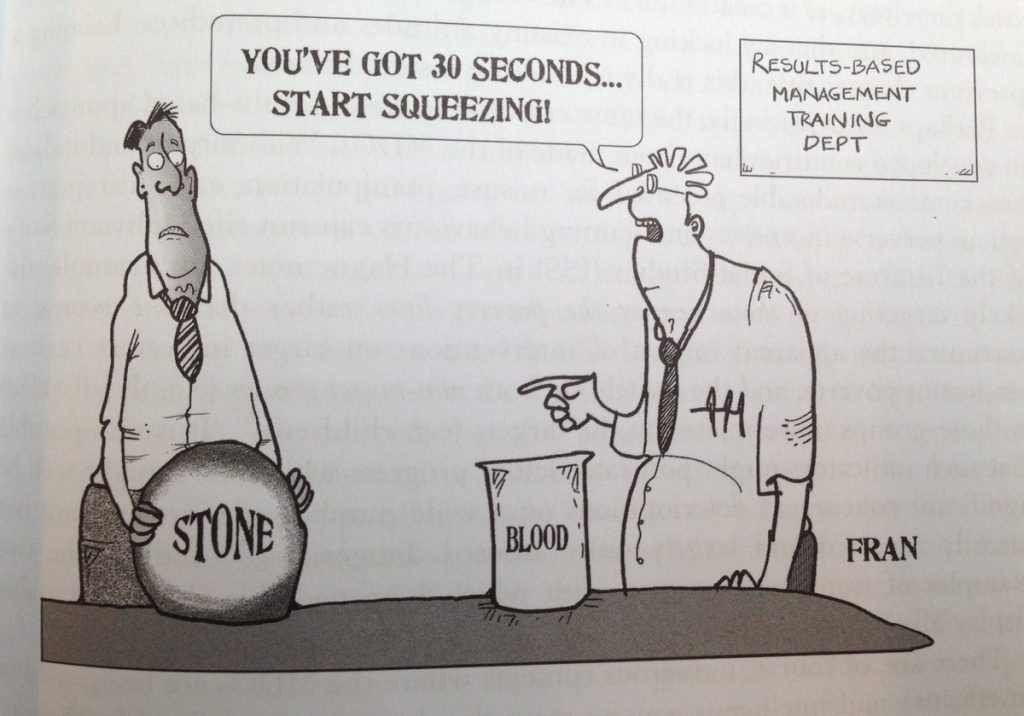Not sure if you can take any more posts on Adaptive Management, but I had an interesting conversation with Stephen Gray on AM and Peacebuilding, which he may be using for a podcast. A few lightbulb moments:
- Things we often assume go together, but they actually don’t. Two candidates:
Results v Risk: There is a vague sense that those evil planners are asking for a bunch of things at the same time

– results, value for money, upwards accountability (e.g. regular reporting to donors) and avoiding screw-ups that can land them in hot water with northern parliaments or publics. But if you believe a growing body of evidence, and the logic of systems thinking, you can’t have all of these things at the same time. Risk means different things to different people, but political risk (the Daily Mail test, not the risk of failing to help poor people) is what keeps politicians up at night. But if they demand zero or minimal risk (eg all those ministerial soundbites about ‘zero tolerance of corruption’), that precludes experimentation and innovation and so undermines results.
So one role for those wishing to encourage experimentation, adaptation and innovation is to help mitigate political risk (another is, of course, just to whinge about how much we hate politicans, but I don’t find that very helpful). Say you want an aid agency to think about risk across its portfolio – it will have a large number of low risk projects, and then a few high risk, high return whacky outlliers that might work, but might crash and burn. A bit like Google has a few bonkers projects like abolishing death (aka a Barbell Strategy). The trouble is that in the aid sector, it’s those that end up on the front page of the Daily Mail, so we need to find ways to insulate donors from project risk, eg by having intermediary/ arm’s length funding mechanisms.
An alternative would be for some foundations with fewer political strings, and a greater appetite for risk, to explicitly position themselves as the whacky adapters, and so provide cover for their more conservative colleagues. I have to say, that the big private foundations often don’t seem to take advantage of their relative political freedom to do this – half the time they behave like wannabe DFID’s with all the panoply of risk avoidance, reporting and results.
Adaptive Management v bottom up/localization: The discussion at the recent AM workshop in Bologna clarified that some local partners, whether governments or CSOs, are not that keen on all that iterative uncertainty. They want trips, training and concrete (schools, roads, buildings). If that is the case, we face a difficult choice: persuade them of the virtues of AM, abandon it, or find different partners, which is hardly an exercise in bottom-up accountability.

2. Trust is the essential currency of Adaptive Management, but we have slipped into a low trust, high compliance culture that is hard to shift. When talking about corporate social responsibility, I always felt very smart when I trotted out the saying ‘we have moved from a ‘trust me’, to a ‘show me’ society’. But that is actually anathema to adaptive management, which relies on trusting programme staff and partners to do ‘adaptive delivery’ – feeling their way and changing their direction on a daily (if not hourly) basis, in response to the signals they are receiving.
All the panoply of reporting and compliance can be seen as a substitute for trust. But how do we rebuild it? Saying ‘just trust me’ is a non starter, because donors need to be able to distinguish between adaptive management and good old fashioned incompetence – changing things on a daily basis, saying you’re not ready to report results, asking to alter the plans and targets could stem from either. One option is to move from compliance to probation – keep new staff or partners on the leash for a certain period of time, but then if they don’t screw up, have an explicit process for reducing compliance and expanding discretion over time. Which is kind of what I did in the early years of this blog (‘moving from permission to forgiveness’).
- How to counter the headwinds that are blocking progress on AM?

When asking why change isn’t happening, a handy rule of thumb is the 3i test: what is the combination of institutions, interests and ideas that is blocking progress? In the case of AM we have:
Institutions: the mechanisms of the aid business – reporting requirements, timebound projects, high staff turnover all seem to work against AM
Interests: Aid organizations need to generate projects to pay their staff and big up their CEOs, while commercial project contractors (a growing presence) also need to make profits. That makes it unlikely that they will start criticising the project gravy train and pioneer new approaches. In the wonderful words of Upton Sinclair, ‘“It is difficult to get a man to understand something, when his salary depends on his not understanding it.”
Ideas: The mental landscape that sees linear projects and plans as the ‘natural’ way to do things may be so deeply rooted that people are simply incapable of imagining a different way of working.
So how ‘we’ – the plucky band of adapters and iterators – disrupt the 3 I’s that together block progress? I guess my shorthand would be – use crises and critical junctures to shake up institutions, advocacy to expose and weaken interests, and education and research to sow the seeds of a shift in ideas (though that may be a generational project). Not enough room to expand on these now, but may come back to it.